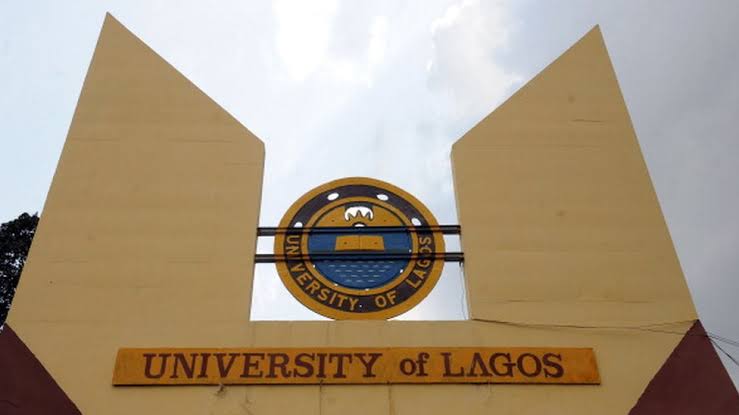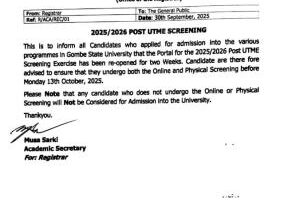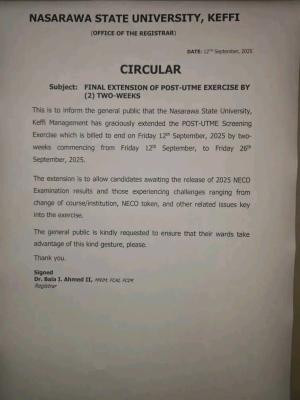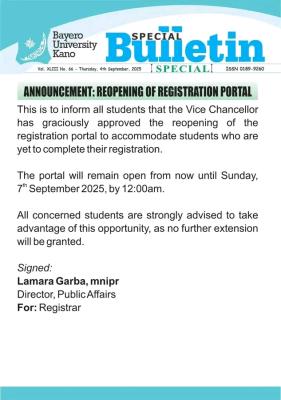The Nigerian education sector has once again been thrown into the spotlight as the Nigeria Labour Congress (NLC) openly joined forces with the Academic Staff Union of Universities (ASUU) in a fresh round of protests against the Federal Government. On Tuesday, August 26, 2025, ASUU members staged peaceful demonstrations at the University of Ibadan (UI) and the Emmanuel Alayande University of Education, Oyo, to demand the immediate signing of the renegotiated 2009 ASUU-FG agreement.
This latest development signals a deepening crisis in Nigeria’s higher education system, with mounting frustration among lecturers, students, and the general public. The protests, which featured placards reading “Preserve Those Who Lay the Golden Eggs” and “Sign the Agreement, Save Education”, served as a clear warning to the Federal Government: fulfill your promises or risk another crippling nationwide strike.
Background: The ASUU Struggle and the 2009 Agreement
The root of this agitation dates back to the 2009 Agreement signed between ASUU and the Federal Government. That agreement focused on several key issues, including:
- Improved remuneration for university lecturers to reflect their workload and global academic standards.
- Better funding for Nigerian universities to improve infrastructure, laboratories, and research facilities.
- University autonomy to reduce political interference in academic affairs.
- Promotion of academic staff welfare to reduce brain drain.
Unfortunately, despite over a decade of negotiations, committees, and government promises, the agreement has remained largely unimplemented. For ASUU members, this represents not only a broken promise but also a deliberate undermining of Nigeria’s education system.
The Protest: Voices from UI and Oyo
At the University of Ibadan, ASUU chapter chairman Dr. Adefemi Afolabi led the peaceful protest, emphasizing that Nigerian lecturers have endured 16 years of failed promises. According to him, this neglect has resulted in low morale, financial hardship, and mass migration of top scholars to other countries where their expertise is better rewarded.
In Oyo, ASUU chairman Dr. Michael Bamidele Ojo joined forces with NLC Chairman, Mr. Kayode Martins, to call out the Federal Government’s “delay tactics.” Ojo warned that if the government continues to frustrate lecturers, Nigeria’s already fragile academic calendar could collapse entirely.
Martins, on his part, criticized the government’s misplaced priorities, pointing out how politicians consistently fight for higher allowances while lecturers—the backbone of Nigeria’s knowledge economy—are left struggling. He declared:
“Those who lay the golden eggs must be preserved.”
This statement resonated with many Nigerians who believe that neglecting educators is equivalent to jeopardizing the nation’s future.
Why NLC’s Involvement Matters
The decision of the Nigeria Labour Congress to throw its weight behind ASUU is significant. For years, ASUU has fought its battles largely alone, occasionally drawing sympathy but rarely securing active solidarity from broader labor movements.
Now, with the NLC standing firmly by its side, ASUU gains:
- Stronger bargaining power – A united labor front increases pressure on the government to act.
- Wider public support – The issues at stake go beyond university education; they touch on national development.
- A bigger threat of nationwide strike – If NLC mobilizes its members across different sectors, the country could face disruptions far beyond the university system.
The August 28 Deadline: A Make-or-Break Meeting
The protests were not just symbolic. ASUU and NLC leaders made it clear that unless the government signs the renegotiated agreement at the scheduled meeting on August 28, 2025, they may have no choice but to call for a nationwide strike.
Given Nigeria’s history with prolonged ASUU strikes—some lasting up to nine months—the implications for students are severe. Delayed graduations, disrupted academic calendars, and loss of motivation are common consequences. Parents, too, are burdened financially and emotionally, while the country as a whole loses credibility in global academic rankings.
Why This Struggle Matters for Students and Nigeria’s Future
- Brain Drain: Each time lecturers are poorly paid and undervalued, Nigeria loses its brightest minds to Europe, North America, and Asia. This “brain drain” weakens the country’s research capacity.
- Decline in Education Quality: Without proper funding, Nigerian universities struggle to provide world-class education. Students are forced to learn in overcrowded classrooms with outdated facilities.
- Economic Consequences: A weak university system produces graduates who are less prepared for the global workforce, worsening Nigeria’s unemployment crisis.
- Generational Impact: Today’s students—tomorrow’s leaders—are directly affected by the instability caused by recurring strikes.
The Bigger Question: Can Tinubu’s Government Redeem Itself?
President Bola Ahmed Tinubu came into office promising reforms, stability, and renewed hope. But as the NLC and ASUU protests reveal, his government is now being accused of failing to honor commitments. If nothing changes, the administration risks not only another round of strikes but also a major credibility crisis.
The solution is clear:
- Sign and implement the renegotiated 2009 agreement.
- Prioritize education in the national budget.
- Engage in genuine dialogue with ASUU and NLC.
- Develop a long-term strategy to fund and reform higher education.






